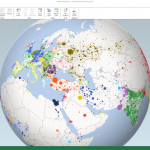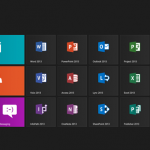Microsoft celebrates 10 years of OneNote -- one notable decade

It may be hard to believe, but OneNote was released in November 2003. To many mature users of Microsoft's Office suite, it still feels like a "new" addition. Sadly, many people do not use the note-taking, collaboration solution, likely from a lack of education on the software. I am only a few years removed from college and never observed a single student leveraging OneNote in the classroom; they all used Word. This is unfortunate as it is a great cross-platform solution -- Windows, iOS, Android, and Windows Phone are now all supported.
To celebrate the 10 year anniversary, Microsoft is launching the One Notable Decade campaign. This should hopefully raise awareness of the powerful software. Today, Microsoft shares some examples of how OneNote helps people be successful in their lives.
Microsoft now offers 256GB Surface Pro outside of Japan, but can you buy it? [update]

Microsoft released the 256 GB Surface Pro in Japan almost a month ago and, since then, it left potential buyers puzzled as to when the new model arrives outside of the land of the rising sun. Well, the date is today, as Microsoft just expanded the availability of the latest Surface Pro version to include new major markets. There's a catch though.
Microsoft tells me that "there will be limited availability of a 256GB version of Surface Pro in the U.S. exclusively through the commercial channel and the authorized Surface resellers". This model runs for $1,199, making it $200 more expensive than the 128 GB Surface Pro which goes for $999. And, at least at the moment, the former cannot be purchased from Microsoft Store or any retail shop.
Steve Ballmer's hits and misses from Build 2013 keynote

Perpetual release cycles. Windows 8.1. The unified Windows ecosystem. If there are any key takeaways to remember from Microsoft's cornerstone keynote at the Build 2013 conference, these three items would sum it up quite well. Microsoft CEO Steve Ballmer reminded thousands of developers on stage last week that the company isn't getting left in the dust and it has a solid plan going forward.
While most of the tech world was keenly focused solely on Build 2013 as the gateway to the first official peek at Windows 8.1, Ballmer's keynote had a few other important messages to deliver. The Windows update, formerly known as "Blue", may have stole the show but Microsoft had a grander agenda to piggyback at the developer conference.
Outlook 2013 will finally come to Windows RT

On Wednesday, Microsoft revealed that Outlook 2013 finally arrives on Windows RT later this year, alongside the free Windows 8.1 upgrade. The application, known for offering advanced contacts, calendar and email functionality, joins Word, Excel, PowerPoint and OneNote, part of Office Home and Student 2013, on the tablet operating system.
"Windows on ARM is a core part of our strategy today and moving forward, and the addition of Outlook further enriches this world of new on-the-go opportunities for partners and customers", says Microsoft's Tami Reller. According to the software giant, Outlook is one of the most sought-after applications on Windows RT, being a "popular request from consumers and businesses alike".
Microsoft reorganization is long overdue

Today, over at all AllThingsD, Kara Swisher reports that a major Microsoft makeover is imminent. Reorganization is bloody well overdue, and timing makes sense. The company's fiscal year closes June 30, and the final quarter is when employees, product groups and future plans are evaluated and rewarded and when internal changes occur.
I strongly expect the new structure to mesh with CEO Steve Ballmer's mandate Microsoft is now a "devices and services" company. His larger challenge is surmountable: Enabling a stronger siloed Microsoft that disables a power structure that resembles "A Game of Thrones" -- too many fiefdoms fighting cross-purposes to the kingdom Bill Gates created. Under the current structure, Ballmer deals with only five kingdoms, rather than book and HBO series' seven.
Microsoft Q3 2013 by the numbers: $20.49B revenue, 72 cents EPS

Today, after the closing bell, Microsoft revealed what might be the closest-watched quarterly results in 11 years. Fiscal third quarter, like the one in 2002, marks a time of record-low PC shipments, with blame falling on the newest operating system. In recent weeks, every idiot arm-chair pundit imaginable has taken to the web to proclaim Windows 8 a failure and prophesying Microsoft's doom. Not so fast. This company is still a money machine.
For fiscal Q3, ended March 31, Microsoft revenue reached $20.49 billion. Operating income: $7.61 billion and net income was $6.06 billion, or 72 cents a share.
Project GeoFlow gets public preview

Microsoft announced GeoFlow at the SharePoint conference in November 2012 and today rolled out a public preview of the 3-D mashup that combines the Office spreadsheet app Excel with Bing maps to allow you to plot geographic and temporal data visually.
Microsoft Research claims that GeoFlow "enables information workers to discover and share new insights from data through rich, 3-D data on a globe and fluid, cinematic guided tours—virtual cinematography moving through data". The app evolved out of the WorldWide Telescope project. "We built a gigantic virtual telescope, but to do so, we had to build an engine that could visualize the universe. If we can visualize the universe, we can visualize almost anything else", Microsoft Research principal researcher Curtis Wong explains.
Microsoft rolls out Office 2010 SP2 beta

By now a number of you have probably joined me in moving on to Office 2013, either the desktop version or the new Office 365 Home Premium subscription adaptation of the suite. However, there is nothing wrong with the previous Office 2010 release of the product, and many users and businesses are still running that software.
For those, there is some good news this morning -- Microsoft has released a beta version of Service Pack 2 for Office 2010. The SP2 beta also includes Sharepoint 2010 support as well. In addition, it has improved support for Internet Explorer 10 and Windows 8, updates for system reliability, program compatibility, security and more.
Microsoft wins, even if the PC loses

I am simply stunned by the ridiculous number of "Microsoft will be dead in four years" stories, following Gartner's grim PC forecast three days ago. I offered brief analysis then and promised something later, and this is it. Yesterday, colleague Alan Buckingham posted first: "Microsoft is nowhere near death's door" -- and he absolutely is right.
Throw a rock, and you can't miss a doom-and-gloom armchair analysis. Among the many are "Gartner: Microsoft is dead, Windows has expired, Office has ceased to be" (Computerworld); "How long can Microsoft go on like this?" (InfoWorld); "Apple's ultimate victory over Microsoft" (Motley Fool); and "Gartner may be too scared to say it, but the PC is dead" (ReadWrite). For the most part, all these armchair pundits are mistaken. Hugely.
Using Office in Windows 8? Microsoft wants to help

Every week Microsoft's Office team does a webinar. That is not news, but this week the company is focusing on Office specifically within Windows 8. While perhaps many of you are not yet using the latest versions of Office and Windows, it is pretty much assured that eventually you will be -- assimilation is inevitable.
With that thought in mind, Microsoft's Doug Thomas announces that "if you are working with Windows 8-or your business will be using Windows 8 soon-check out this week's webinar. We will go over shortcuts and quick navigation for keyboard and mouse, plus answer your questions".
Microsoft BUILD 2013: 'If you're going to San Francisco...'

Suddenly San Francisco is the hot developer ticket of the year. Say, can I just rent a room in your house for May and June? Today, Microsoft announced that BUILD 2013 will take place from June 26-28 at the Moscone Center in the city on the bay. Google will be there, same city and venue, with I/O from May 15-17. Apple usually holds its developer conference there in early June but hasn't announced. Big Three trio would be a helluva travel schedule for anyone flying in from anywhere else, particularly outside North America. Choose your event(s) wisely.
I just have to ask: Did Microsoft bump Google? Last year, I/O moved from its more typical May schedule to late June -- 27th-29th. Did Steve Ballmer and Company book early and lock in the dates? I don't really care, and it's not news, but speculation is delicious given the rivalry between these two companies.
You CAN use Office 2013 Trial for more than 30 days -- how's 180?

DiSTANT X has released Office Trial Extender 1.0.0.7, a new build of its tool for legally extending the trial period for Microsoft Office 2010or later to a maximum of 180 days. The new version adds support for the latest Office 2013 release, renames itself Office Trial Extender and ensures all its files are digitally signed.
The tool works by resetting your Office trial to 30 days, and can be used a maximum of five times, giving you a theoretical maximum trial period of 180 days -- with caveats, as we discuss below.
Microsoft caves on Office 2013 usage rights, kind of

See, if enough people complain and bloggers and journalists write enough misinformed, sensational stories, image-conscious Microsoft goes into public relations damage control. That's the case with Office 2013, which gets new licensing terms that grant you the right to move the software to another PC.
Under the old agreement, Microsoft used activation technology to bind the productivity suite to one computer. The software couldn't be transferred. The restriction comes with another nick, which isn't changed: With this version, Microsoft takes away generous multi-PC rights available with older versions. Like I expressed in late January, "Microsoft really doesn't want you to buy Office 2013" but subscribe with Office 365 instead. Nothing is changed, there. Today's concession is all PR blush.
Of course Microsoft limits Office 2013 rights

I'm not surprised about the weekend furor over changes to Office 2013 retail licensing terms. Gregg Keizer, writing for Computerworld, has done some of the best reporting on this topic. He deserves your pageviews, starting with this story. I can confirm what he writes, that the new End User License Agreement restricts usage to one PC and isn't transferrable. Whether or not Microsoft actually enforces the provision, or changes it, is another matter. We'll see.
What does perplex me: Why there is no backlash about other licensing term changes that are considerably more onerous and costly. Like I explained last month, "Microsoft really doesn't want you to buy Office 2013". That is the reason for all these licensing changes. The company wants consumers to purchase Office 365 instead.
The new Office has launched -- let the advertising blitz begin

We spent a lot of time dissecting Microsoft's Office launch yesterday and one thing was clear. The software giant wants you to move away from the desktop and into the cloud with Office 365 Home Premium. Something which I for one do not think is a bad idea. To prove where its priorities lie, Microsoft has unveiled its very first video ad for the new suites and predictably it's all about Office 365.
The 30-second length of the clip indicates that it is likely headed for TV, although I personally have not seen it there yet. It does nothing to show customers the actual apps like Word, Excel, and the rest. Instead it focuses on more of the Metro Modern UI aspects, and the suite's ability to be available for users at all times, wherever they are.
Recent Headlines
Most Commented Stories
BetaNews, your source for breaking tech news, reviews, and in-depth reporting since 1998.
Regional iGaming Content
© 1998-2025 BetaNews, Inc. All Rights Reserved. About Us - Privacy Policy - Cookie Policy - Sitemap.